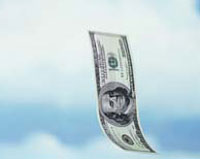Nobody wants to rescue dollar
With the world financial crisis at hand, people might want to cheat on something they got used to. Like the U.S. dollar.

The world was waiting all the last week, but nothing serious occurred in the exchange market. The session of the Central Banks of Great Britain and Europe that took place this week, was expected. There the problems of money-credit policy were considered. As the market participants expected that the interest rate in Europe will remain the same and will decrease in England, the behavior of Central Banks hadn’t made any substantial changes in the deal on Forex.
The US dollar got under pressure after the speech of the former chairman of the United States Federal Reserve Board Alan Greenspan, who called this credit crisis the most serious in the past 50 years.
In the end of the work week the dollar was hit by the publication of Index of Consumer Expectations by the University of Michigan and Reuters. This month the index recessed from 69, 5 to 63, 2 points, its lowest since 1982. This data means the decline of real consumption and the rising inflation. So the stabilization in consumer’s sector is still a long way to go.
There Central Bank representatives expressed great concerns about the weak position of dollar, but didn’t propose any particular measures to improve the situation. Neither was the intervention of powers into the exchange market discussed.
The financial heads of Canada and Japan didn’t express any will to hold interventional actions. Moreover, German representatives refused to intervene in the global financial processes. Japan also claims for keeping the financial systems stabilized.
Ministers of Finance explained their passivism by saying that any activities without thorough changes in credit-money conditions would be inefficient. This can be explained by the fact that the Central Banks pick different ways in the question of monetary policy change. Federal Reserve Board of the USA decreases the interest rate while the Central Bank keeps it on the same level, trying to hold the inflation level. It’s impossible to think that they will take cooperated decision in changing the interest rate. Until this occurs, the management of the currency rate will be inefficient.
Anyway, the situation with euro is not much better. According to the data published by International Monetary Fund, negative reports of European banks can be expected in the following weeks. IMF states that the value of writing off bad mortgage debts constitutes 120 billion dollars. Note that the US investment banks that have already divulgated this index, state they have written off 140 billion dollars.
Soon when this information is declared, people will realize it irrational to keep money in European banks.
Translated by Lena Ksandinova
Subscribe to Pravda.Ru Telegram channel, Facebook, RSS!





